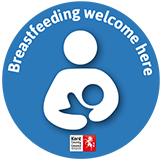Feeding your baby
Learning how to breastfeed or bottle feed, and starting solids with your baby can be exciting. But it also comes with challenges and lots of choices to make. What works for some families might not for others.
The good news is that you’re not alone. There’s lots of help and advice available. You can get support for when you begin feeding your baby and throughout the whole journey.
Visit the Kent Family website for helpful tips about breastfeeding, bottle-feeding and introducing your baby to solid food.
Book an in-person ready for baby course on the Kent Family website to help you choose how to feed and build a close relationship with your baby.
Discover more ways below to help you feel confident feeding your baby.
Breastfeeding
Breastfeeding has long-lasting benefits for mums and babies. Your breast milk even adapts to the changing needs of your baby as they grow. It also helps to prevent tummy bugs and childhood obesity.
World Health Organisation recommends breastfeeding your baby until they are 6 months old, and then alongside solid foods until they are 2 years old or more.
You might need help getting started on your breastfeeding journey or anywhere along the way. Breastfeeding is a new skill for both mums and babies to learn. Positioning and attaching your baby is something that takes a bit of time but there are plenty of places to go for help.
Breastfeeding groups and local support
You might need some face-to-face help with breastfeeding. Health visiting teams offer breastfeeding groups where you can meet other women, share experiences and get support. Learn about latching on, increasing milk supply, protecting sore nipples or other breastfeeding skills.
Your midwife, health visitor or GP can refer you to a specialist service when you need extra help. Visit the Kent Family website for details about the Specialist Infant Feeding Service.
Information about breastfeeding
Find tips online and in-person groups where you can learn how to breastfeed your baby.
- The Beside You website can answer all of your questions about breastfeeding.
- Visit the Kent Family website for detailed information about feeding your baby.
- Find a face-to-face local breastfeeding support group using your postcode on the Beside You website.
Breast pump hire
You might qualify for a free handpump or to borrow an electric pump if you meet one of the following criteria:
- eligible for the Healthy Start Scheme
- be experiencing premature birth
- have an infant with ill health.
You must also be receiving feeding support from a health or social professional or a voluntary organisation.
Find your nearest breast pumps using the map at the bottom of the Beside You page on expressing milk.
Helplines for breastfeeding
Call the Breastfeeding Network helpline on 0300 100 0212 day or night. Or use the web chat, social media, or support in other languages on the National Breastfeeding Helpline website.
Call the National Childbirth Trust (NCT) helpline on 0300 330 0700 any day between 8am and midnight. Or visit the NCT website page on support with breastfeeding or bottle feeding: our infant feeding line.
Supporting breastfeeding women
Breastfeeding isn’t just about mums and babies. Everyone can support mums and babies through this important time.
When it comes to supporting breastfeeding women, even the smallest gesture can make a huge difference.
Learn how to support women and babies whether you’re a dad, a grandparent, a venue, a friend, or a professional on the Beside You website’s supporting breastfeeding help page.
The law protects you from being asked to leave a public space while breastfeeding and many businesses in Kent have signed up to support breastfeeding. Look out for the Breastfeeding Welcome stickers for a safe and comfortable place to breastfeed.

Bottle feeding
You can feed your baby using expressed breastmilk or infant formula in a bottle. You may wish to bottle feed all of the time or decide to do combination feeding, sometimes giving your baby a bottle alongside breastfeeding.
On NHS Start for Life, you can learn how to:
- feed responsively, when your baby needs it and spot the cues
- prepare milk and a bottle
- wind your baby.
Learn about bottle feeding on NHS Start for Life website
Introducing solid food
In their first year, babies get most of their energy and nutrients from breast milk or first infant formula. Most babies are developmentally ready to try their first solid foods around 6 months old. You can introduce your baby to a varied diet, alongside their usual milk. This is sometimes called weaning or complementary feeding
Visit the NHS Start for Life website page to learn about introducing your baby to solid foods. Get tips from other parents, lots of healthy recipes and meal ideas, and watch helpful videos.
Or visit the Kent Family website for detailed information about feeding your baby.
Help buying milk, food and vitamins
If you're pregnant or have a child under the age of 4, you might qualify for a Healthy Start card.
This gives you money towards milk, formula, fruit and veg. You can even use your card to order free vitamins.
Find out more about the Healthy Start scheme on our page help to buy food, milk and vitamins.